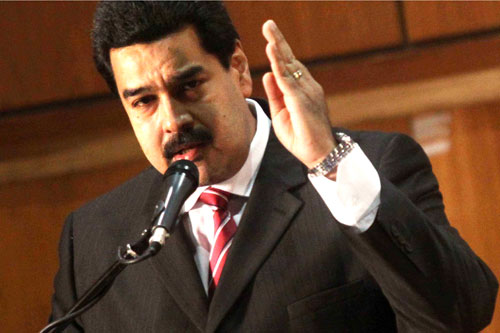
At his inauguration in April 2013, President Maduro said his presidential term would be ‘a revolution within the revolution – efficiency or nothing’, stressing that ‘Only with the people, with socialism’ was it possible to live humanely. In the last few months, Maduro has taken steps to implement this vision by cracking down on corruption and battling against food shortages, speculation and hoarding.
Following the violent aftermath of the April presidential elections, when fascist opposition gangs ransacked and torched public services and state buildings leaving 13 dead, the Venezuelan government has faced down continuing attempts by the imperialist-aligned opposition to destabilise the Bolivarian Revolution. The opposition’s accusations of electoral fraud were exposed as empty posturing when the results of a two-month audit of 100% of the votes found a 99.98% correspondence between paper and electronic votes. Those present at the audit included candidate representatives, external auditors, electoral council technicians and 141 representatives from civil society groups. This transparency, coupled with broad international recognition of the results, has left the opposition scraping the barrel for fresh smears, such as claiming that Maduro was in fact born in neighbouring Colombia, making him ineligible to be president – a claim easily disproved.
Crackdown on corruption
Speaking at a rally marking the 24 June anniversary of ‘the Battle of Carabobo’, a key date in Venezuela’s struggle for independence, Maduro emphasised:
‘Either we confront this today or corruption is going to swallow up our country. We cannot divorce ourselves from the ?ght against those who are corrupt and their methods of corruption.’
Deeds have matched words. Maduro has replaced directors in the national electric system in order to tackle the sabotage which resulted in frequent blackouts in the run-up to the presidential elections. He has responded to denunciations of speculation and extortion within the country’s consumer protection agency, Indepabis, which regulates price controls, leading to the high-profile arrest of its director, Luis Garcia, and his head of control and inspection Trino Martínez. In June, two senior employees within SENIAT, the national customs, duties and taxes administration were arrested for fraud and in July five civil servants working for the China-Venezuela investment fund were arrested on suspicion of embezzling $84m. These five officials are alleged to be members of opposition party Primero Justicia (Justice First) whose National Assembly legislator, Richard Mardo, is being prosecuted for money laundering. Also in July, seven immigration service officials were arrested in Tachira, on the border with Colombia, for corruption and trafficking and in Monagas, the manager of the legal division of the state oil company PDVSA was detained for corruption. This endemic culture of corruption permeates even community organisations, as evinced by the arrests of 14 people involved in illegally charging people for access to houses and other benefits available through the Bolivarian social missions.
Rooting out corruption is essential to driving forward the struggle for socialism in Venezuela. To do so requires fundamentally addressing Venezuela’s heritage as an under-developed country dependent on extracting and exporting oil, a phenomenon Chavez referred to as the ‘oil-rentier state’. Unravelling this culture of pervasive corruption and materialism will take huge advances in deepening socialist consciousness and making significant inroads into undermining the capitalist free market in Venezuela. With 70% of the economy still in the hands of private companies and oil accounting for around 90% of export earnings, building a society driven by people’s needs, not profit, will initially mean diversifying the oil-dependent economy, and removing ruling class control over key economic sectors, principally finance, food production, and food distribution, and fostering a non-private productive sector.
The situation is exacerbated by economic sabotage facilitated by the unequal terms of trade between Venezuela and imperialist countries. Chavez introduced currency controls and a fixed exchange rate in 2003 in direct response to opposition-led oil lock outs and economic sabotage. While this initially reduced capital flight to a third of its 2002 level, it continues to be a major problem with an average of $20bn estimated to have left the country each year since 2008. A widespread illegal parallel market exists, where companies import products using government-issued dollars set at the controlled exchange rate of 6.3 bolivars, then sell these products for around 30 bolivars per dollar. A whole web of extortion surrounds this practice which also contributes to food insecurity as items are hoarded, creating shortages and driving up prices. Since January at least 40,000 tons of hoarded food have been discovered, including rice, coffee, sugar and cooking oil. Redistribution of this food in addition to subsidised exports from Mercosur countries have turned the tide in this battle, reducing the food scarcity index from its April peak of 21.3% to 19.3% in June. But winning the war will mean taking down Venezuela’s private networks such as POLAR, which controls nearly 50% of national food production.
Maduro has appointed Eduardo Saman, known to take a hard-line against speculation, as the new head of Indepabis. His government has implemented stronger state controls over foreign exchange, in order to monitor companies that import products using state-issued dollars. These state measures need to work in tandem with the organisations of popular power, increasing democratic control of government policy. A citizens’ network ‘Friends of Indepabis’ has been set up to expose companies that break price control laws and the grassroots forum Aporrea is also encouraging public denunciations of corruption in Caracas.
As Maduro stated in July: ‘Whoever is involved in shady businesses and thinks that they can take advantage of the power that the government has given them in order to steal, well, their time has come now … no one is untouchable, whether it’s corruption in a red beret or corruption of the yellow fascist bourgeoisie’. There must be no exceptions.
Sam McGill
Fight Racism! Fight Imperialism! 234 August/September 2013




